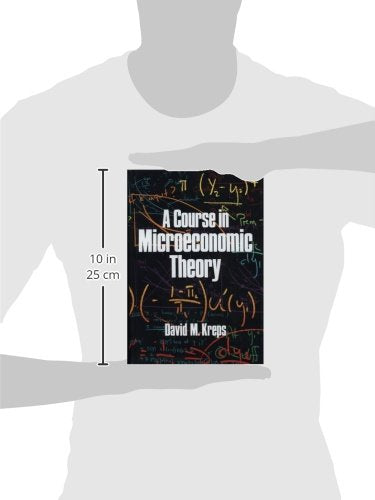
Title



A Course in Microeconomic Theory,New
Delivery time: 8-12 business days (International)
David M. Kreps has developed a text in microeconomics that is both challenging and 'userfriendly.' The work is designed for the firstyear graduate microeconomic theory course and is accessible to advanced undergraduates as well. Placing unusual emphasis on modern noncooperative game theory, it provides the student and instructor with a unified treatment of modern microeconomic theoryone that stresses the behavior of the individual actor (consumer or firm) in various institutional settings. The author has taken special pains to explore the fundamental assumptions of the theories and techniques studied, pointing out both strengths and weaknesses.The book begins with an exposition of the standard models of choice and the market, with extra attention paid to choice under uncertainty and dynamic choice. General and partial equilibrium approaches are blended, so that the student sees these approaches as points along a continuum. The work then turns to more modern developments. Readers are introduced to noncooperative game theory and shown how to model games and determine solution concepts. Models with incomplete information, the folk theorem and reputation, and bilateral bargaining are covered in depth. Information economics is explored next. A closing discussion concerns firms as organizations and gives readers a taste of transactioncost economics.
By changing our most important processes and
products, we have already made a big leap forward. This ranges from the
increased use of more sustainable fibers to the use of more
environmentally friendly printing processes to the development of
efficient waste management in our value chain.
⚠️ WARNING (California Proposition 65):
This product may contain chemicals known to the State of California to cause cancer, birth defects, or other reproductive harm.
For more information, please visit www.P65Warnings.ca.gov.
Shipping & Returns
Shipping
We ship your order within 2–3 business days for USA deliveries and 5–8 business days for international shipments. Once your package has been dispatched from our warehouse, you'll receive an email confirmation with a tracking number, allowing you to track the status of your delivery.
Returns
To facilitate a smooth return process, a Return Authorization (RA) Number is required for all returns. Returns without a valid RA number will be declined and may incur additional fees. You can request an RA number within 15 days of the original delivery date. For more details, please refer to our Return & Refund Policy page.
Shipping & Returns
Shipping
We ship your order within 2–3 business days for USA deliveries and 5–8 business days for international shipments. Once your package has been dispatched from our warehouse, you'll receive an email confirmation with a tracking number, allowing you to track the status of your delivery.
Returns
To facilitate a smooth return process, a Return Authorization (RA) Number is required for all returns. Returns without a valid RA number will be declined and may incur additional fees. You can request an RA number within 15 days of the original delivery date. For more details, please refer to our Return & Refund Policy page.
Warranty
We provide a 2-year limited warranty, from the date of purchase for all our products.
If you believe you have received a defective product, or are experiencing any problems with your product, please contact us.
This warranty strictly does not cover damages that arose from negligence, misuse, wear and tear, or not in accordance with product instructions (dropping the product, etc.).
Warranty
We provide a 2-year limited warranty, from the date of purchase for all our products.
If you believe you have received a defective product, or are experiencing any problems with your product, please contact us.
This warranty strictly does not cover damages that arose from negligence, misuse, wear and tear, or not in accordance with product instructions (dropping the product, etc.).
Secure Payment
Your payment information is processed securely. We do not store credit card details nor have access to your credit card information.
We accept payments with :
Visa, MasterCard, American Express, Paypal, Shopify Payments, Shop Pay and more.
Secure Payment
Your payment information is processed securely. We do not store credit card details nor have access to your credit card information.
We accept payments with :
Visa, MasterCard, American Express, Paypal, Shopify Payments, Shop Pay and more.
Related Products
You may also like
Frequently Asked Questions
- Q: What is the main focus of 'A Course in Microeconomic Theory'? A: The book primarily focuses on modern noncooperative game theory while providing a unified treatment of microeconomic theory, emphasizing the behavior of individual actors in various institutional settings.
- Q: Who is the author of this book? A: The author of 'A Course in Microeconomic Theory' is David M. Kreps.
- Q: What is the publication date of this book? A: The book was published on February 21, 1990.
- Q: How many pages does 'A Course in Microeconomic Theory' have? A: The book contains a total of 863 pages.
- Q: What condition is the used book in? A: The book is listed as being in good condition.
- Q: What type of binding does this book have? A: The book is available in hardcover binding.
- Q: Is this book suitable for undergraduate students? A: Yes, the book is designed to be accessible to advanced undergraduate students as well as first-year graduate students.
- Q: What topics are covered in this book? A: The book covers topics such as choice under uncertainty, dynamic choice, noncooperative game theory, models with incomplete information, information economics, and transaction-cost economics.
- Q: Does this book include practical applications of microeconomic theory? A: Yes, it includes practical applications and discussions that explore fundamental assumptions of the theories and techniques studied.
- Q: What edition of the book is available? A: This listing is for the Standard Edition of 'A Course in Microeconomic Theory'.
